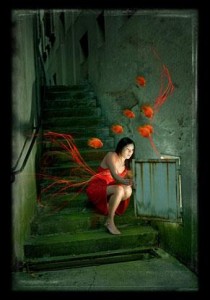A couple of weeks ago at the university where I teach, I spoke at an event organized by socialist students to debate the future of women’s liberation. One woman in the audience said afterwards that it was a relief to hear something political about women. Recently she had gone to another talk which she thought was going to be about feminism, and found it was actually a pitch for the Women’s Institute.
My reaction was much the same as hers had been—incredulity. Why on earth would 18-21 year-old students be interested in joining the Women’s Institute? But a few days later I read a newspaper report which claimed that women students all over the country are setting up branches of the WI. Or at least, they are trying to. According to the report, some of them are running into difficulty because many students’ unions refuse, on grounds of gender equity, to recognize societies which do not allow both sexes to be members. And so it has come to pass that an organization founded during World War I, and long associated with a very traditional view of women’s role, now finds itself in the vanguard of a movement to reclaim women-only space on university campuses. What is a radical feminist supposed to think?
I have my own, not very positive, memories of the WI. In the early 1980s when I belonged to a rape crisis group, I sometimes gave talks to local women’s organizations like the WI, the Townswomen’s Guild and the Housewives’ Register. Invariably the WI women were the most conservative. They tended to be very keen on the law and order aspect—locking rapists up and throwing away the key—but what they understood by ‘rapists’ was monsters leaping out of the bushes to attack some innocent maiden on her way home from church. And it was always a bit surreal giving a talk about rape which was preceded by announcements about jam-making sessions and followed by a competition for the prettiest scarf or the most effective spring flower arrangement.
But it seems the WI has moved on. Today, the causes it supports include not only fairly uncontroversial ones like Fairtrade, and women’s development projects overseas, but also less comfortable things like the Campaign to End Violence Against Women.
If press stories are anything to go by, such political concerns are not high on the agenda for the new campus WI branches. Their reported activities have included tea-drinking, cake-baking and (allegedly) knitting iPod covers. But as retrograde as this might appear, I think there is something behind it that feminists would recognize and support.
To get to the ‘future of women’s liberation’ event, I had to fight my way through a college bar full of braying young men in what appeared to be fancy dress (they wore flat caps, plus fours and patterned socks, and some of them were carrying leather whips). On inquiring who they were, I was told that they were known as ‘hunters’, and that one of their recent exploits had been to organize a ‘hunt’ in which female ‘foxes’ were chased by male ‘hounds’. When one woman complained that this sort of thing was all too common, and that the students’ union had ‘a completely sexualized entertainments policy’, it was clear that her words struck a chord.
Women students today inhabit a culture where sexual objectification and predatory male behaviour are normalized, and it seems that quite a lot of them are angry about that. At the same time, they are reluctant to be labelled ‘feminists’ because of the social disapproval that would incur among their peers. If the WI provides such women with an alternative—an acceptable way to spend time with other women, and potentially a space in which to explore their feelings about the way women are treated elsewhere—then on balance I think I’m for it.

